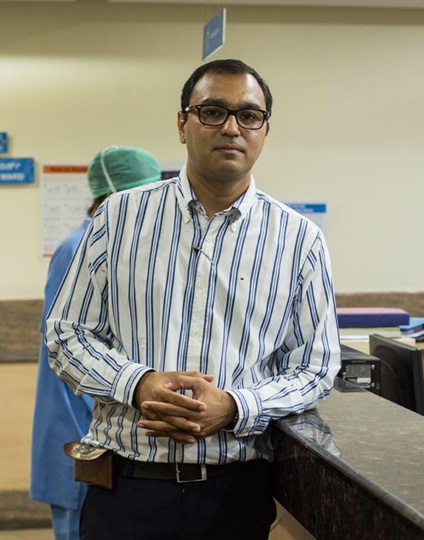India is home to the largest population of visually challenged people in the World (2011 census). Visually challenged people face fundamental challenges in mobility, education, employment and an independent living, which ultimately impact their inclusion and integration into the society. From visiting a neighborhood grocery store to opening and maintaining bank accounts, every quotidian task is a herculean travail.
Blind people generally use a white cane to assist them in walking. But these sticks do not have a great utility as they can only help the blind identify obstacles on the ground and not those high up such as tree branches, protruding ACs and even animals and people for that matter.
To overcome this hurdle, a group of passionate technologists, an IIT professor and a social entrepreneur joined hands and came up with an innovative product that aims to alleviate the hardships faced by visually challenged people when it comes to independent mobility. The main man of this incredible innovation is Dr. Rohan Paul.
In his own words:
“In 2005, I was at the Indian Institute of Technology in Delhi as an undergraduate. As part of a course intended to design solutions for real-life challenges, we visited the National Association for the Blind in Delhi. We heard stories of how people with blindness get hurt when out walking—abruptly hitting open windows, tree branches, or vehicles. It creates so much fear that they are reluctant to step out without assistance.
We envisioned a sensing system on canes. By the end of the first year we had a basic prototype using ultrasonic ranging for detection and vibrations for feedback. You could see the users smile once they detected an obstruction; many refused to give back the prototypes!
We involved the users from the very beginning. They insisted that the device has to be small; if it falls it should not break; and it should allow any gripping or holding style. It has to detect everything, from signboards, people, parked cycles, or even cattle blocking the path—and also respond to obstacles approaching fast.
Women told us they wanted a device to be small enough so the cane can fold and fit into their purse. And they debated about color. Why? Because they would show it to someone else and say: ‘Am I looking smart with this?’ Men wanted to know if it will prevent touching or colliding with people; they told of women turning around and slapping them after such unintentional accidents. They don’t want to say, ‘Oh … excuse me, I didn’t see.’ It is about dignity as well as everyday safety. We engineers at times overlook the human side of a technology like this.
We ended up with a sleek handle-shaped attachment that fits on the traditional white cane. When we tested it in 2012 we saw users had 95 percent fewer collisions. We released it as a product in early 2014. The SmartCane costs only about $50 and is already in the hands of about 10,000 people. Our aim is to help one million or more worldwide.
It is a ‘people’s product’—a humble tribute to the Mahatma, who inspired innovators to harness science and technology for the masses.”Pukar App
In the past few years, the safety of women in Indi...
Smart Cane
India is home to the largest population of visuall...
Sanket ECG Device
Cardiovascular Disease is a major health concern f...

₹50 Voice Prosthesis ( Dr. Vishal Rao)
Dr. Vishal Rao U.S. is a renowned Oncologist based...
 Donate
Donate Spread The Word
Spread The Word